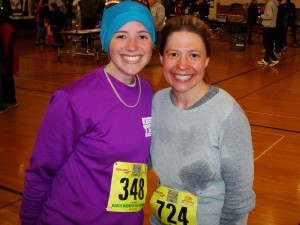March Madness Recap

This past weekend, Chicago saw some seriously shitty weather on Saturday. It was that nasty “wintry” mix stuff that combines wet snow, rain, and wind, which makes you feel like someone’s throwing sharp little knives at your face, and no matter how you cock your head, or how much you grit your teeth, there’s just no way to get comfortable. Yuck. Luckily, I wasn’t planning to run our group’s slated 15 miles on Saturday because I was running the Hillstriders’ March Madness half marathon out in Cary, IL, which is located roughly forever (70-ish minutes?) away from Chicago.
The March Madness race is like a secret that you want to share, because you know how good it is, but one that you want to keep to yourself, because you want to stay privy to the information. I’ll explain.
Apparently, the race is limited to only about 1k runners each year, mostly because it’s on a Sunday morning, and the runners overtaking the rural country roads interfere with the church-going crowd. (Logic would say to a) hold the race on a Saturday or b) start the race earlier than 8:35, but who’s reason to mess with church? Anyway….) That said, getting an entry into the race is like getting a golden ticket from a Wonka bar. The 2010 race registration opened on New Year’s Eve day and filled in — get this — 5 hours. Unless you were sitting by your computer, credit card in hand, you probably didn’t get an entry. I took my laptop with me to the DR for the express reason of registering as soon as I possibly could.
The race, itself, is probably the hardest half marathon I’ve ever run (in addition to the Mill Creek Distance Classic in Youngstown, Ohio). It’s hilly, and in all the wrong spots — much like the Boston Marathon! In fact, that’s why many people run the March Madness race … as a Boston tune-up. Check out the map below; you’ll get my drift. It’s the best-kept secret that you kinda, but don’t really, want to share.
March Madness Half-Marathon Course
Here’s another picture of my training buddy, Chris, and me, taken right after we finished. I think we look much more awake and alert than we probably feel 🙂
I ran a satisfying 1:41, slightly slower than last year, and pulled a 12th place finish in my age group and among the top 50 women. I tried to run the race thoughtfully and not go balls-to-the-wall early on, for I knew what hills lied ahead, and when I finished, though tired, I still had some juice in the tank. The race, and my performance, definitely made the drive worthwhile.
We’re officially less than a month from the 114th running of the Boston Marathon, kids. Next up: the last of our three 20-milers before Boston, plus roughly a million Yasso 800s this week.
Bring it on.